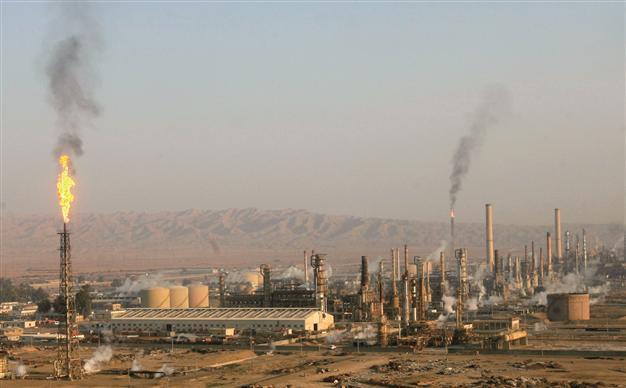Turkish energy minister warns of risks amid Iraq refinery battle
MOSCOW/TIKRIT - Reuters

Battles raged between Iraqi government forces ISIL militants for the control of the country’s largest refinery. Turkish Energy Minister Taner Yıldız has warned the fuel shortage from refinery blockage in Iraq would build-up activity at border gates. REUTERS PHoto
Iraq’s extra demand for Turkish fuel due to the Baiji refinery attack will strain the limited border export capacity, Turkish Energy Minister Taner Yıldız said, as Iraqi government forces battled Sunni rebels for control of the country’s biggest refinery.
Iraqi government announced it took retook the control of Baiji June 19 as Prime Minister Nuri al-Maliki waited for a U.S. response to an appeal for air strikes to beat back the threat to Baghdad.
Yıldız told reporters during a trip to Moscow that Iraqi demand for Turkish refined oil products could cause a bottle-neck at the border with northern Iraq and it was unclear whether the demand could be fully met.
“This increase in the demand for refined oil products will cause a build-up of activity at the Habur border gate. Physical conditions including security concerns will determine whether the demand can be met,” Yıldız said.
Unrealized border gate plansThe sprawling Baiji refinery, 200 kilomters north of the capital near Tikrit, was a battlefield as troops loyal to the Shi’ite-led government held off insurgents from the Islamic State of Iraq and the Levant and its allies who had stormed the perimeter a day earlier, threatening national energy supplies.
A government spokesman said around noon that its forces were in “complete control” but a witness in Baiji said fighting was continuing and ISIL militants were still present.
In Arbil, the capital of Iraqi Kurdistan which remained stable amid the increasing violence across the north of the country, there were long queues at petrol stations due to panic buying even though there were no actual shortages.
“People are panicking because of the Baiji refinery,” one taxi driver in Arbil said. “Deliveries are coming though. There are few shortages.”
Officials from the Kurdistan Regional Government (KRG) visited Turkey in April and started talks on opening five new border gates to avoid the frequent long queues at Habur.
Turkish Trade Minister Hayati Yazıcı said last November that Turkey had agreed with Iraq on opening two new border gates after talks with Iraq’s central government and the KRG.
None of these gates have been so far been opened, leaving Habur as the only crossing.
OPEC member Iraq was Turkey’s biggest crude oil supplier in 2013 and it buys back refined oil products, particularly diesel, to meet its booming electricity demand.
“This refinery was supplying northern Iraq but now it is unable to do that. We already supply fuel to the region to a certain extent,” Yıldız said.
Meanwhile, oil flow at Iraqi Kurdistan’s pipeline link to Turkey continued and a third export cargo shipped to world markets independently was scheduled to load this weekend.
Yıldız said buying crude oil from the KRG was definitely an option. “Tüpraş has not yet bid for this oil but it could in the coming period.”
Video aired by Al-Arabiya television showed smoke billowing from Baiji and the black flag used by ISIL flying from a building. Workers who had been inside the complex, which spreads for miles close to the Tigris river, said Sunni militants seemed to hold most of the compound in early morning and that security forces were concentrated around the refinery’s control room.
The 250-300 remaining staff were evacuated in the early hours of June 19, one of those workers said by telephone. Military helicopters had attacked militant positions overnight, he added.
